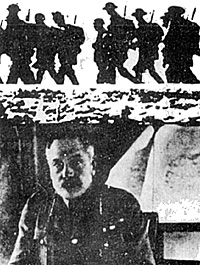
As I dictate this it is 8.30 a.m. on the 1st July 1976 - exactly 60 years ago today the Battle of the Somme began and in the hour that has passed since the British New Army went over the top at 7.30 a.m. at least 20,000 men have fallen. By the end of this fine summer's day in Picardy, the British Army has taken 60,000 casualties in what was the greatest disaster to British arms in the history of this Nation.
Just over a month ago, in company with others of the Military Historical Society, I spent a most emotive week touring these battlefields which, more than any others I have ever tramped, seem still to be alive with the very spirits of the men who were -brave and timid, wounded or killed. The sobering effect that this has had on me has led to the reflection that most of our present-day troubles probably started on the 1st July 1916 when a fine army imbued with a crusading spirit backed by a comradeship that has probably never been surpassed, found themselves shattered both physically and morally. Since then this Nation has steadily lost respect for its leaders, questioned authority and viewed with cynical detachment the judgements of those who are supposed to possess the capacity to intelligently guide our lives.
What has all this got to do with wargaming might well be asked? Well, there were those of us in the party who said more than once - "No sensible wargamer would send his armies into this" or "If the British Commanders had been wargamers they would have handled this differently." With hindsight this might be correct and certainly there is reason for questioning the convictions and judgement of Haig and Rawlinson in their headquarters some 13 and 19 miles behind the lines respectively. In justification, they were not blessed with that God-like vision that enables the wargamer to adeptly cope with surprise and concealment but perhaps had the battle been fought as a wargame, aided by such modern accessories as computers, the error of their judgements might have come to light and saved a military disaster.
It is said that the great German victory of Tannenberg in 1914 was master-minded by having been pre-played as a wargame and I well remember facing across the table the redoubtable Brigadier Peter Young DSO.,MC., who handled his miniature figures in such true military style that I hardly managed to get on the table!
Incidentally, Peter Young is firmly of the opinion that his pre- 1939 wargaming activities greatly aided him in his attitude towards the minor tactics required for his commando operations. H.G. Wells, the Grand-daddy of wargaming, as long ago as before World War I wrote that all Kings and blood-thirsty generals should be made to fight their wars out with model soldiers and toy cannon. Conversely, this might lead to the belief that table-top wargamers would make good generals - a typically stupid question that has been asked me time-and-time again on T.V. and radio.
They certainly would NOT make good generals if only for the conflicting reasons that their profligate activities with inanimate metal or plastic figures would make them so disregardless of human life as to incur disaster or else they would identify themselves so closely with the men under their command as to refuse to take even the minor necessary risks of warfare.
Greater military brains than mine have also been struck with the dis-similarity between training and real warfare - John Keegan of the R.M.A. at Sandhurst, increasingly disturbed by the manner in which officer-cadets are trained in their approach to warfare, has written a book The Face of Battle which lays it all right on the line. Read it - it not only will revolutionise your ideas of warfare but probably turn your table-top attitude and tactics upside-down!
Back to Table of Contents -- Wargamer's Newsletter # 173
To Wargamer's Newsletter List of Issues
To MagWeb Master Magazine List
© Copyright 1976 by Donald Featherstone.
This article appears in MagWeb (Magazine Web) on the Internet World Wide Web.
Other articles from military history and related magazines are available at http://www.magweb.com